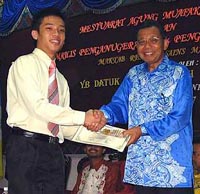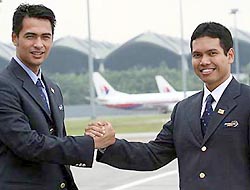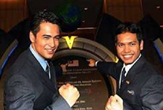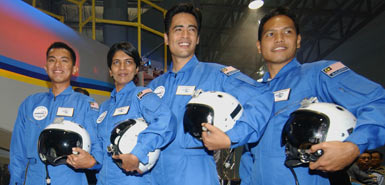Topic: - The Prog. - General
KUALA LUMPUR: Most Malaysians do not take the National Angkasawan Programme seriously, and programme director Col Dr Zulkeffeli Mat Jusoh is not happy with this.
"A recent survey revealed that they still think it's a waste of time and money, and that we're just going to undertake a 'little' science project once our angkasawan (astronaut) is sent into space."
"Worse, many are still under the assumption that we are going to play gasing (top) or make teh tarik (tea) in space."
"Nothing could be further from the truth."
"Our objective is to uncover monumental findings in the field of science and many countries, the United States and Russia included, are eager to see the results of our experiments," he told a press conference on Tuesday.
Dr Zulkeffeli said that our angkasawan would face a very regimented schedule in carrying out the four major experiments.
These include studying liver cancer and leukemia cells, bacteria, protein crystallisation and the physics of objects in space.
"Every single move and action of the angkasawan must be planned to the minute, as only 108 minutes per day can be allocated for carrying out the experiments."
"In addition to this, our angkasawan will only be able to conduct these projects on the third day after going into space due to logistics constraints."
"Clearly, we do not want to waste any time as our findings could significantly change and contribute to the field of modern medicine, science and industry," said Dr Zulkeffeli, who was also flanked by the two Angkasawan candidates Dr Sheikh Muszaphar Sheikh Shukor and Dr Faiz Khaleed.
The institutes, which drew up the experiments and will supervise the Angkasawan, are Universiti Kebangsaan Malaysia, Universiti Malaya, Universiti Teknologi Mara, Universiti Darul Iman, Universiti Putra Malaysia, Malaysian Genome Institute, Aviation Medicine Institute, Sunway University College, Health Ministry and Malaysian Agriculture Research and Development Institute (Mardi).
The idea is to carry out the studies in a microgravity and space radiation condition, as both aspects have a significant impact on various organisms and biological systems.
He added that the study of an object’s physics in space, such as a spinning top (the source of the public’s mockery on the experiment) was not to be misunderstood.
He said such experiments would help significantly in attracting the young to take notice of the world of science.
"We want them to think of science as a 'cool' thing. Such experiments in space are easier to relate to children and help them learn about physics and science simply because it intrigues them."
"There is clearly a huge misconception from the public about our objectives here."
"Even the Ecuador Government has expressed interest in letting their young to learn from our Angkasawan Programme. Why should our young be left behind?" he asked.
Dr Zulkeffeli also said many challenges, such as equipment containment and safety issues, were posing as drawbacks to the programme, but he was confident of ironing out all these before the Angkasawan blasts off for space in October.
Only one candidate will be chosen for the programme and the selected one will be named at the very last moment.
Source: The Star Online






